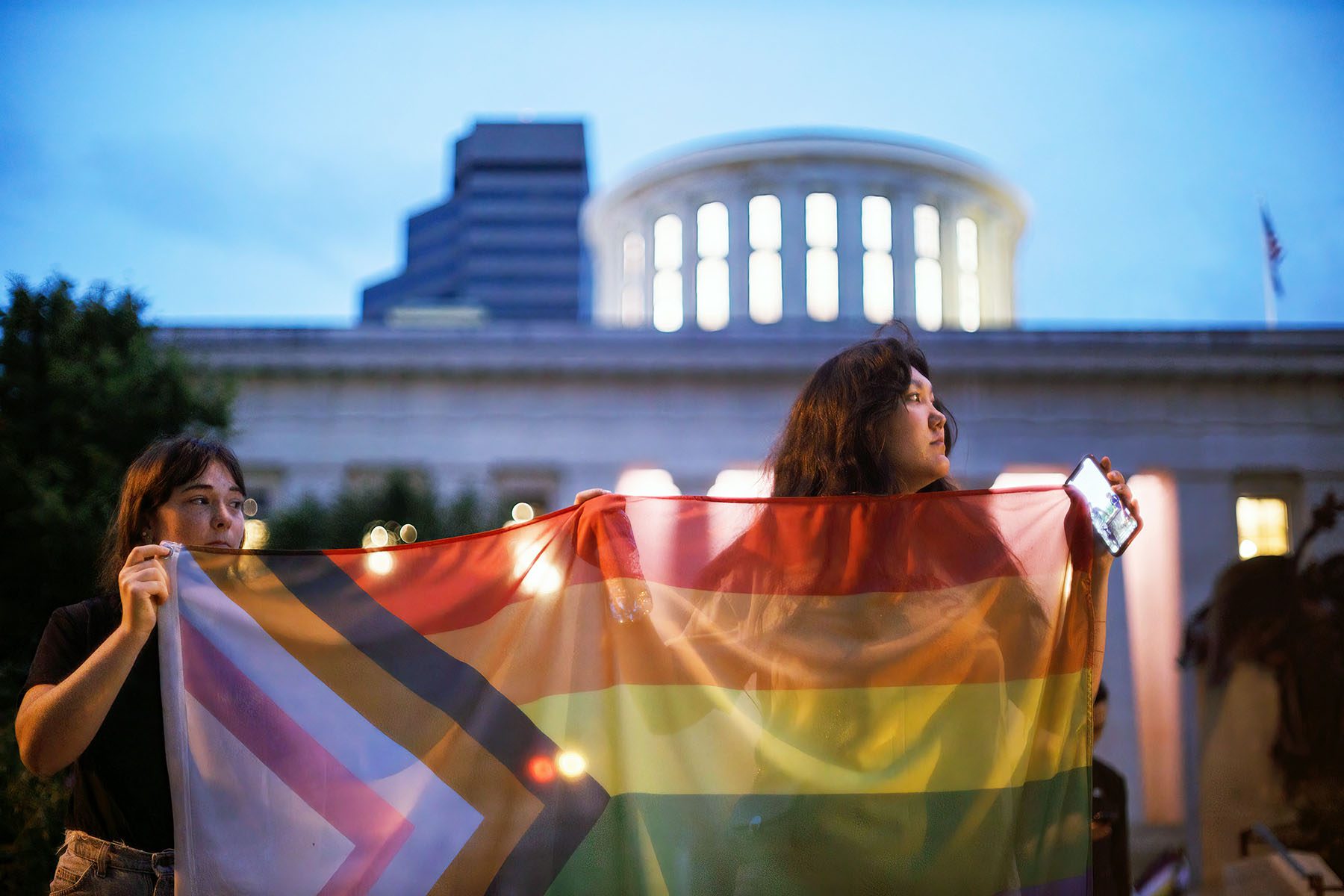Transgender kids’ sports participation and access to gender-affirming care are a top priority for Texas’ third special legislative session that began on Monday. Gov. Greg Abbott named a long-debated bill to ban trans students from playing sports that match their gender identity as one of his core reasons for calling another session — and the bill is just one part of a legislative push targeting trans kids across several dozen states.
Trans Texans and their families are feeling the strain of having to repeatedly speak out against the legislation, and the frustration from seeing how lawmakers talk about them and their loved ones. And still, advocates on the ground are also seeing how privilege impacts who has the opportunity to make their voice heard.
Abi Robins, a yoga therapist living in Austin, was one of the people testifying against the sports bill — formerly Senate Bill 2, now Senate Bill 3 — in the last special session, staying until 4 a.m. on August 25. They were at the Capitol for over 18 hours.
“I was in tears listening to some of the testimony in support of this bill,” they said. “And some of the things they say about trans children, it’s heartbreaking.”
Being in the room as lawmakers claimed that trans people are mentally ill, or that parents of trans children are committing child abuse, took a toll on them. None of Texas’ proposed legislation acknowledges transgender as an identity, and sponsors of the bills have continued to stress in debates that the legislation is “about protecting female athletes.” Robins said they could hear that erasure reflected in the discourse around the bill.
Sports provided an outlet for Robins when they were a kid. Throughout high school, softball, volleyball and track gave them a space to be themself before they even had language to know they were trans and nonbinary. While playing, they felt less self-conscious about their gender.
“Sport was actually a really wonderful place, because the ways in which I was different weren’t as big of a deal,” they said.
Off of the track, field or court, however, Robins didn’t have the opportunity to live as themself while growing up the way that trans kids do today, they said. It devastates them to think that a bill that could threaten a new generation of trans kids — one that Robins says has a greater understanding of themselves and more chances to be who they are.
After processing the last special session in therapy, they plan to return to the Capitol in the third legislative session to again testify against the legislation, adding in a text: “I’m ready.”
Rev. Remington Johnson, who served as an interim pastor at Hope United Church until this spring and is currently a graduate nursing student, has testified at the Texas Capitol four times this year against anti-trans bills. She’s also volunteered with local LGBTQ+ advocacy groups like Equality Texas, Texas Impact and the Transgender Education Network of Texas to speak against legislation, including religious liberty bills, since 2019. Johnson said she felt “incredibly lonely” testifying in the last legislative session — she feels that many of the queer people in her circles have not made enough of an effort to push back against the state’s anti-trans bills.
Soon after realizing the governor had called for trans participation in sports to be debated in Texas’ third special session, Johnson said she felt sick and angry.
“I am leaning into my anger and just letting it burn for a bit because I know that if I try to cool down before I am ready I will just crumple,” she said in a text to The 19th. “Doing this work is hard. Have your therapist on speed dial, hard.”
Nearly 1 in 3 LGBTQ+ youth, ages 13 to 24, reported participating in any kind of sport in the Trevor Project’s third annual mental health survey. The organization found a similar rate of sports participation last year among a younger cohort of 13 to 18-year-olds. Across the country, state lawmakers have failed to cite cases of trans youth posing a problem in sports — or participating in school sports at all.
That lack of data undermines lawmakers’ rhetoric that trans inclusion would overrun teams and lead to an unequal playing field, Jonah DeChants, research scientist at the Trevor Project, said.
LGBTQ+ kids should be able to “receive all of the mental, physical, social benefits of being on a sports team,” he said.
The Trevor Project didn’t publish data solely on trans or nonbinary youths’ sports participation, though some kids responding to the survey pointed to policies that would keep them from playing with other girls or boys as a reason for staying out of sports altogether.
“I probably wouldn’t be allowed onto the boys’ team because I’m a trans boy (both parents and school won’t allow this), and even if I was allowed I’d be at a huge risk of bullying,” one respondent wrote.
Doing this work is hard. Have your therapist on speed dial, hard.
Rev. Remington Johnson, who has testified at the Texas Capitol four times this year against anti-trans bills
On top of the newly proposed legislation, some trans children in Texas are already living with restrictive rules. Kristin, the president of a public relations firm in Austin, said that her 15-year-old daughter is just happy to be with other girls when she gets up early, before 6 a.m., to attend cross country and track meets — even when she doesn’t get to participate.
“She gets to go to practices and meets … but she doesn’t actually get to participate like all the other girls,” Kristin said. “Being a manager is the only way she can be on the girls’ team.”
Kristin did not want to use her daughter’s name, or their last name, to protect her family against potential harassment.
This is the first year that Kristin’s daughter, a sophomore, has taken in-person classes at her public high school after the pandemic started. It’s also the first year that she’s been able to publicly be herself, after she came out as transgender following middle school.
Since 2016, Texas’ regulatory body for high school athletics has required trans students to join single-gender sports teams according to what is on their birth certificate. Under that rule, Kristin’s daughter is barred from competing with the other girls, though the school’s coaches have tried to include her through practice meets.
“She gets to run about every other day,” Kristin told The 19th. “She doesn’t complain … but it makes me really sad for her.”
Under this rule, when a student updates their birth certificate as they transition, they can join the team that matches their gender identity. SB 3 would block public schools from acknowledging that change. The paperwork to update her daughter’s birth certificate is in process, Kristin said. But the current rule — and the state’s legislative push to make future competition impossible for her daughter — makes her feel powerless and frustrated about Texas’ priorities.
“As parents, all we want to do is protect our kids and do what’s best for them. But I can’t do that,” she said, adding: “She still shows up every day, even though she’s being told ‘you’re different’ … but she still goes out there with a smile on her face and does it every day.”
Regardless of whether bills like SB 3 pass, advocates fear the language in and around them that characterizes trans girls as boys will spur violent attacks. Those attacks are consistently made against people of color.
The majority of trans people that have been killed this year were nearly all Black women and Latinas — a trend that repeats year over year, as marginalized people are targeted for their race and gender.
Still, as people head to capitols to speak against the bills, it is mostly White parents of trans kids that tend to be the face of the debate, Victoria Kirby York, deputy executive director of the National Black Justice Coalition, said.
“I’m not saying they shouldn’t show up,” she said. “But it paints a picture of who the harm is hitting that doesn’t get at the data.”
In Texas, advocates on the ground say that same trend has continued, as more White trans people and their parents have the ability to show up and endure hours of testimony, while others have to choose work or taking care of their families.’
At the Texas Capitol in August, Robins said that all of the trans people they personally met that night were White. Johnson agreed that the trans people that show up to testify are generally White.
“It makes sense, being able to spend an entire workday sitting around doing nothing is a huge function of privilege,” Robins texted.
Testimony for SB2 did not start until 8 p.m., after debate was heard on other legislation.
Adri Pèrez, a policy and advocacy strategist for the ACLU who stayed at the capitol until 7 a.m. in August, said those who can come testify are usually privileged enough to afford missing work or school, or can afford transportation.
“When our democracy functions in this way, we exclude so many people from the process,” they said. “August 24 was already a school day, and you’re hearing bills in the public education committee that are going to affect students.”
Pèrez said that it was mostly White trans people who were able to stay for the marathon of SB2 testimony. Bullying or backlash faced by trans children or teachers that speak out, or even publicly out themselves, can be too high a cost for some, they added.
Many Black parents of trans youth “may go to the mat with the principal of the school about their kid, and their kid being able to play in sports, but may not be willing to put themselves in front of a camera, or in front of lawmakers,” Kirby York said. Ideally, lawmakers should have another way to hear where parents of color stand, she added.
On top of the institutional barriers that bar more people of color from participating, Pèrez noted that the demographic makeup of Texas’ legislature — which is mostly White and male — may not take Black or Latinx trans people seriously if more of them were able to testify.
“Sometimes I’m not entirely convinced that Texas legislators, who themselves are White, would take the time to listen to a trans person of color,” they said.
Pèrez went back to the state Capitol on Monday, at one point leading chants during a protest against the anti-trans bills, and said that people are both fired up and despondent.
“We’re pretty fed up with the fact that we have to keep coming back to defend our humanity.”







